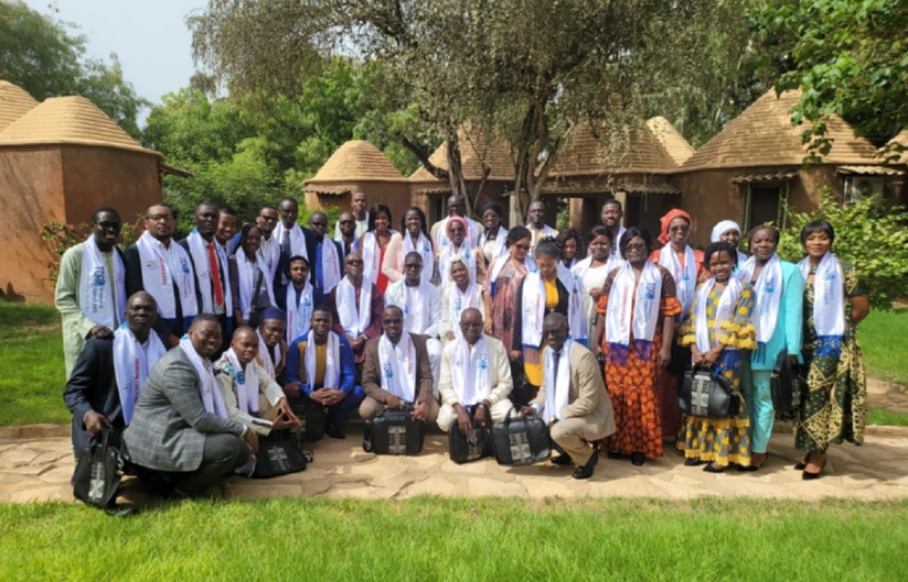TDR, with support from Canada’s International Development Research Centre (IDRC), is strengthening capacity to conduct implementation research using a One Health approach.
The TDR Strategy 2024-2029 recognizes the importance of understanding the complex interactions between humans, animals and their shared environment in driving human diseases of poverty and seeking solutions through multidisciplinary collaboration. However, limited implementation research (IR) capacity using a One Health approach is a key hurdle to generating evidence and increasing its use in decision-making, especially in French-speaking Central and West Africa.
To help overcome this hurdle, TDR, with support from IDRC, has been strengthening research and health leadership in One Health. As part of TDR’s postgraduate training scheme, four students enrolled in the Master of Public Health programme at the Université Cheikh Anta Diop in Dakar, Senegal, are focusing on implementation research projects using a One Health approach.

Master of Public Health students at Senegal's Université Cheikh Anta Diop supported by TDR, at an implementation research workshop in 2023. Credit: Université Cheikh Anta Diop
The collaboration with IDRC also supported the development of a new French-language massive online course (MOOC) on implementation research and One Health. The MOOC was launched in June 2025 through a webinar attended by 1300 participants. Following the first supervised course, run by Université Cheikh Anta Diop, 250 people have completed the course and passed the final exam, among whom 40% are health system professionals. This MOOC adds to a One Health module in TDR’s IR toolkit. Since its publication in July 2024, this module has been accessed more than 3500 times by 860 users.
The four fellows’ research projects are addressing the following topics.
Mali: mapping the impact of environmental factors on malaria dynamics in two health districts
Mahamane Maiga, a physician and public health researcher affiliated with Mali’s Centre de Recherche et de Formation sur le Malaria (MRTC), is conducting a comparative study on the impact of environmental factors on the dynamics of malaria evolution in two eco-climatic health districts in Mali. He has been collecting weather and climate data as well as malaria morbidity and mortality data in the two districts to conduct preliminary analyses.
Guinea: evaluating the impact of the RTS,S malaria vaccine through a One Health lens
Nene Mariama Barry, a Gavi Liaison Officer with an MBA background, is assessing the impact of the RTS,S malaria vaccine in Guinea by exploring the interplay between human behavior, environmental conditions, and animal factors. Her study spans two rural endemic hotspots—Mamou and Kankan—and includes quantitative surveys, qualitative interviews and entomological and environmental monitoring. She is currently designing questionnaires and interview guides to launch the data collection phase in the two hotspots.
Burkina Faso: assessing the impact of larval control and community engagement on malaria transmission
Pagnandé Didier Tiendrebeogo, a medical epidemiologist at Burkina Faso’s National Observatory of Population Health, is evaluating the impact of a national larval control strategy on malaria transmission in the Dafra health district. His research assesses both epidemiological outcomes and community involvement in breeding site elimination and biolarvicide application.
“Through this fellowship, I will gain advanced skills in environmental management and entomology, which will enable me to contribute more effectively to efforts to control vector-borne diseases,” he said.
Senegal: understanding environmental factors associated with adherence to antiretroviral therapy in patients living with HIV
Mama Sagna, a medical epidemiologist and Deputy Chief Medical Officer in Senegal’s Kolda Health District, is investigating how environmental and social factors affect adherence to antiretroviral therapy among people living with HIV. Her research focuses on the impact of seasonal rainfall, geographic isolation and poverty on treatment continuity in rural areas bordering Guinea and The Gambia. With a finalized protocol and pre-tested data collection tools, Sagna’s study aims to generate actionable insights for improving HIV care delivery in vulnerable cross-border populations.
“This fellowship will allow me to strengthen my skills in epidemiology, public health and analysis of the environmental determinants of chronic disease,” Sagna said. “This expertise will benefit my institution, by integrating an interdisciplinary vision of care, and will contribute to improving the quality of care for people living with HIV in Senegal, particularly in rural areas.”
For more information on the One Health MOOC, please contact Dr Anna Thorson. For more on the postgraduate training scheme, please contact Dr Mahnaz Vahedi.

